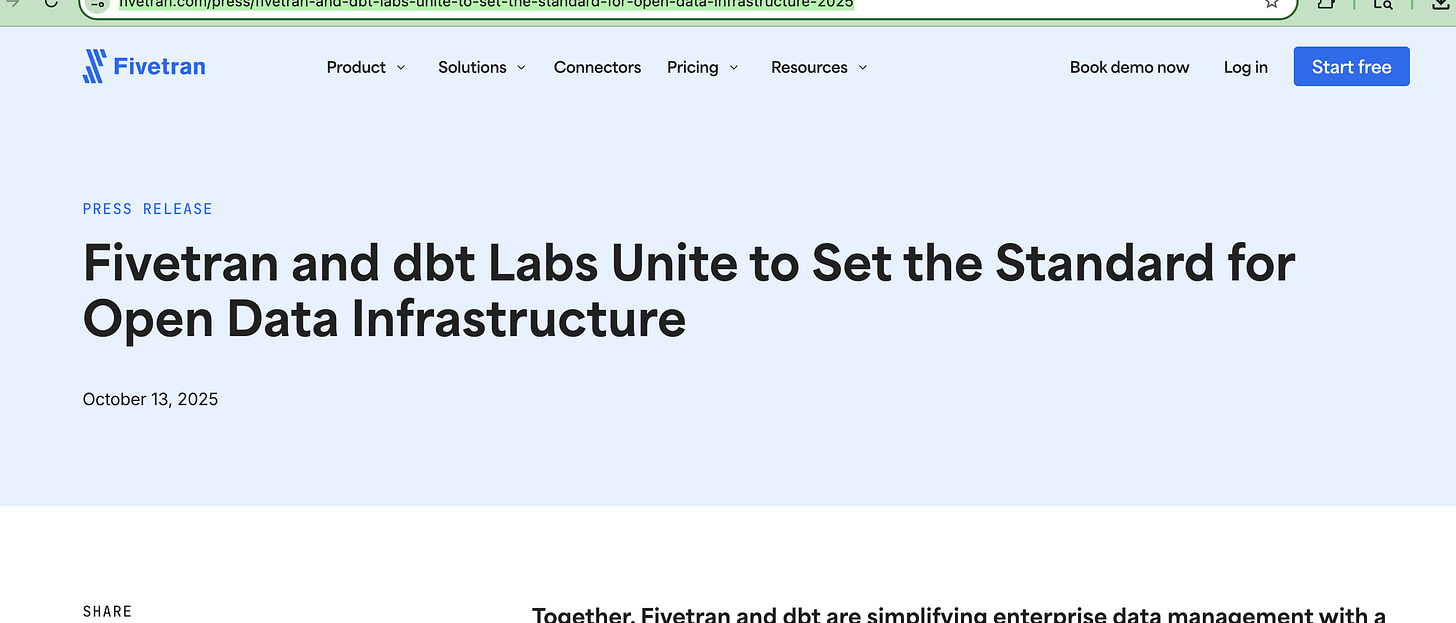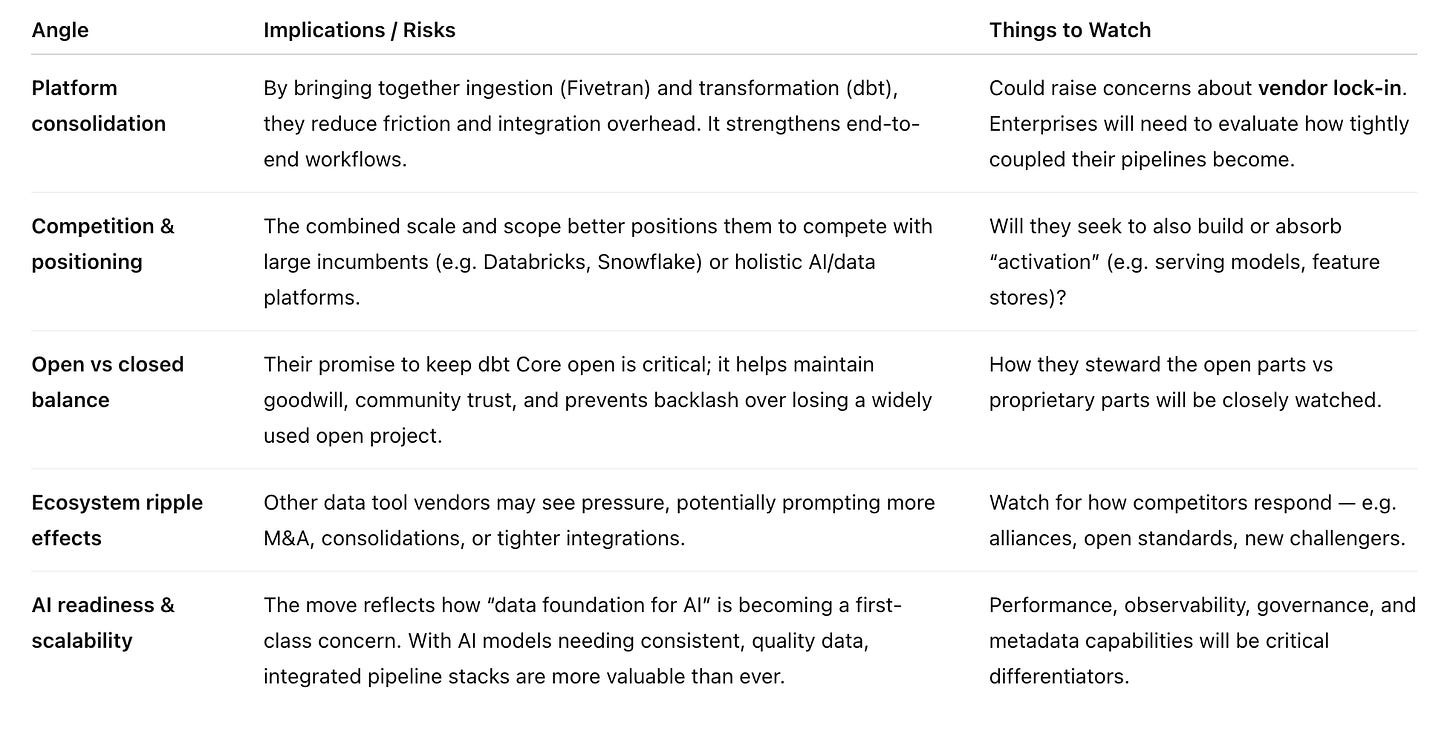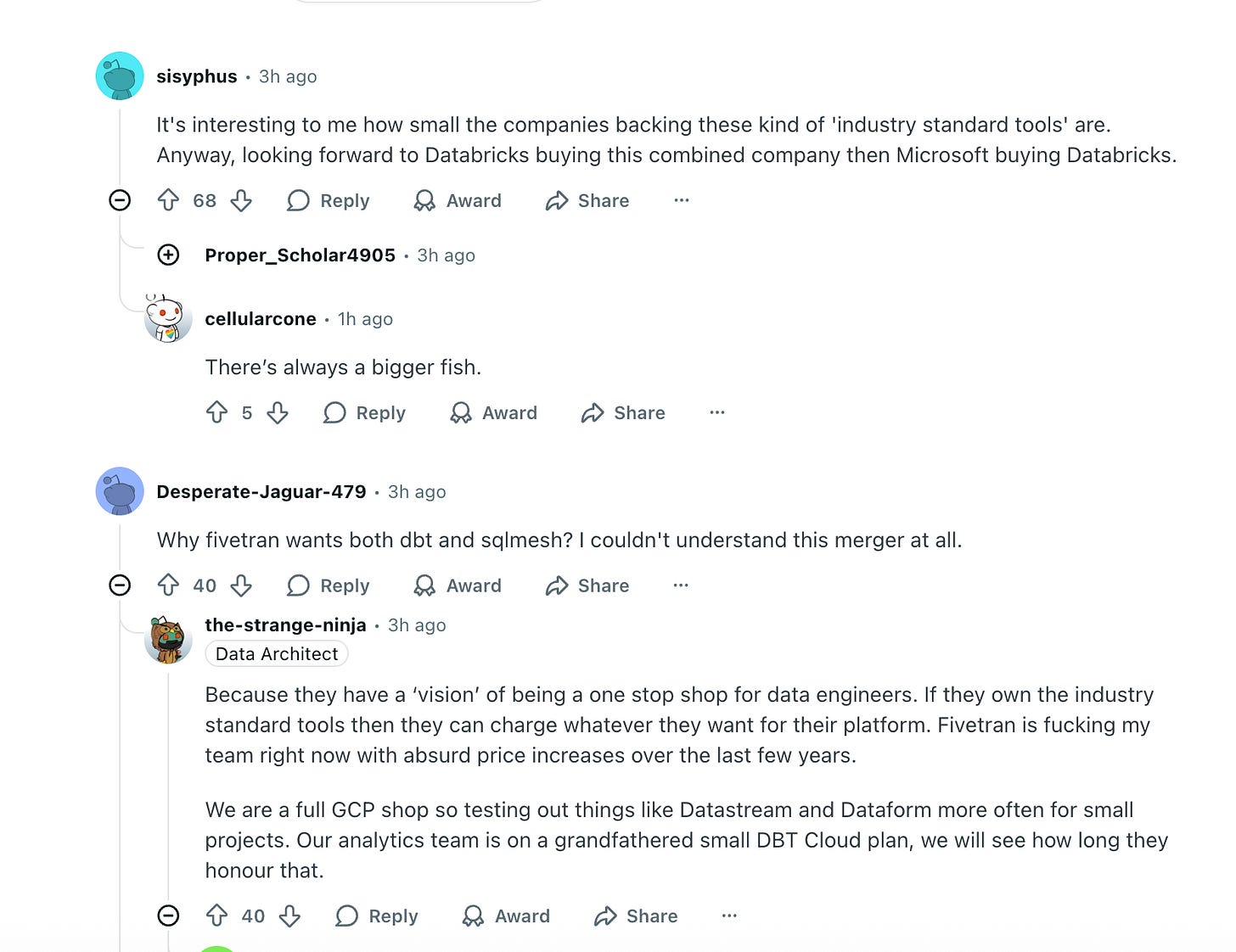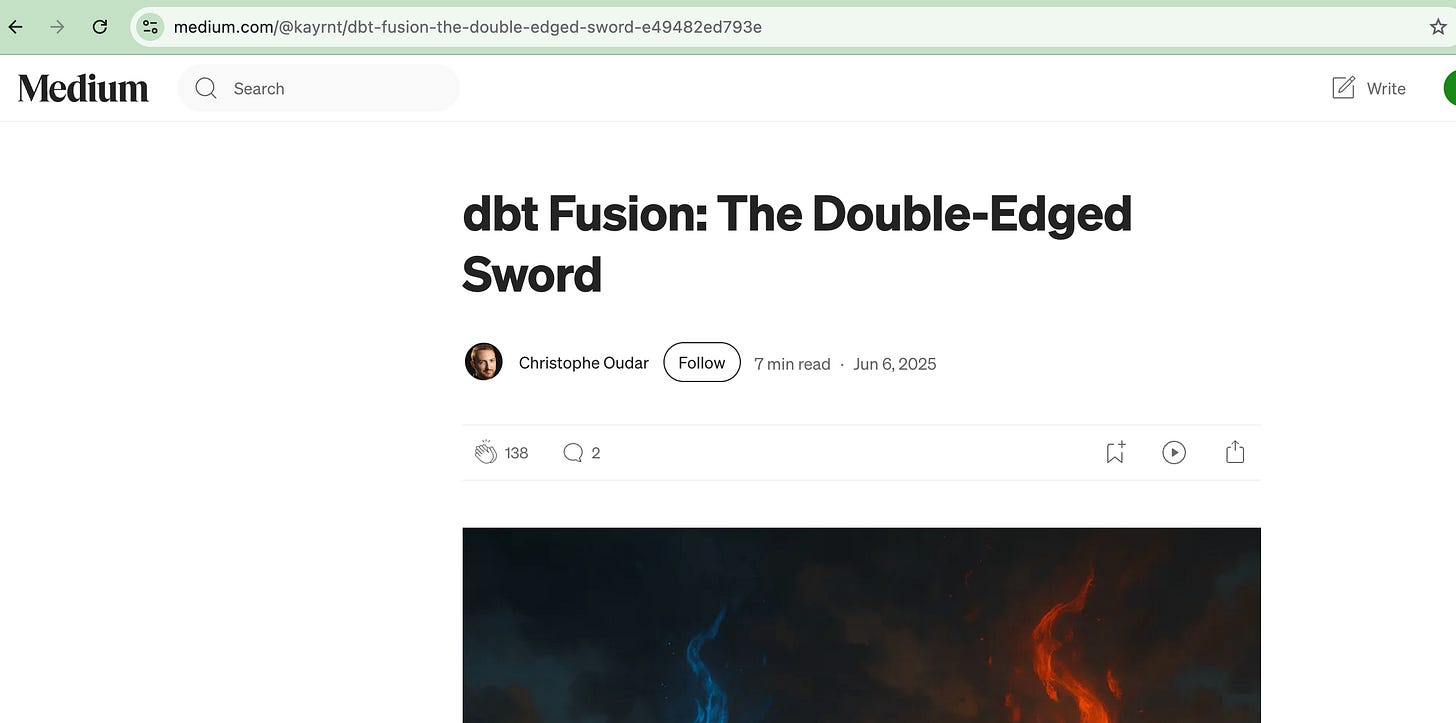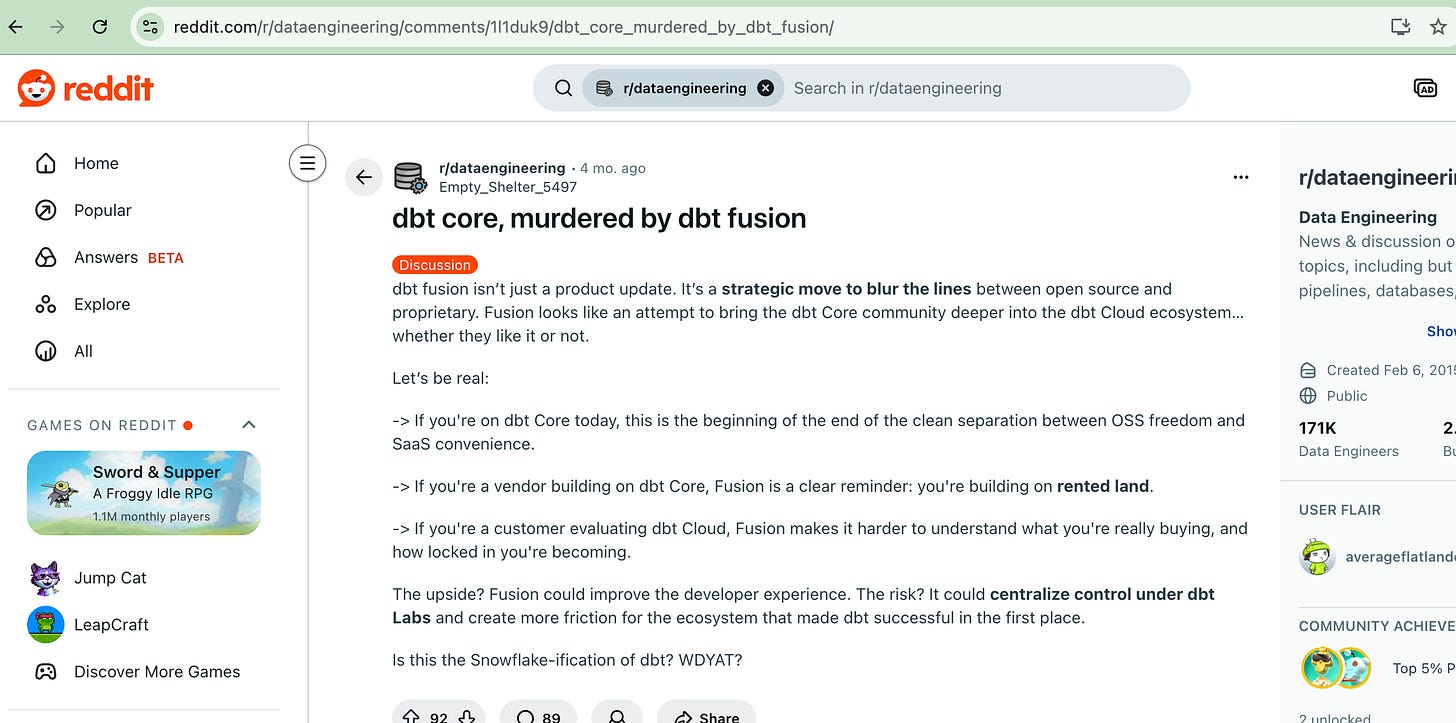Fivetran + dbt Labs merger. What does it mean?
anything at all?
Nothing like a little excitement in the data community to get that talking heads talking and the rumor mills churning. Hey, I like a little excitement on a Monday morning after a long weekend.
That came in the form of Fivetran and dbt Labs combining forces. Guess what, I will do you the favor of giving the WHY and WHY CARE right out the gate, so you don’t have to read the rest.
Data vendors are reading the writing on the wall; they are learning the lesson that Databricks is spanking them and eating the world with its one-stop-shop Data Platform. This is what you call scrambling to catch up.
What the announcement says
Fivetran and dbt Labs are combining via an all-stock merger, forming a unified company with projected annual recurring revenue of ~$600M. Business Wire
Under the deal, George Fraser (currently CEO at Fivetran) will lead the merged entity, and Tristan Handy (dbt Labs CEO) will become co-founder & President. Business Wire
The combined company is positioning itself as an “open data infrastructure” platform — combining data movement (ingestion), transformation, metadata, and activation — while preserving flexibility around compute, catalog, BI, and AI layers. Business Wire
Importantly, they commit to maintaining dbt Core as open source under its current license and to continuing support for its community. Business Wire
Until regulatory and other closing conditions are met, Fivetran and dbt Labs will continue operating independently. Business Wire
TDLR:
The data infrastructure layer is maturing and consolidating, especially as AI workloads impose stricter demands (latency, scale, data quality). This merger could accelerate the shift toward more unified, opinionated “data platforms,” while also reviving debates about openness, flexibility, and vendor choice.
You can see the mad r/dataengineering Reddit mob, for once, can sniff out why this is happening.
What else is there to say?
I mean, for those of us without a horse in the race, it does signify an interesting shift we’ve been seeing in the open-source space … namely, the line between open-source and vendor SaaS has been blurring.
There is nothing open-source about Fivetran. There was/is a large open-source community around dbt, but they had already started complaining before this merger even happened.
If you doubt me, just Google around about it.
The anger is real when someone’s open source baby gets murdered by a SaaS vendor.
One has to imagine, good or bad, that this merger is just another step in that direction. The blurring of lines when it comes to open-source tooling and vendor-provided platforms.
Any good news?
Well, that depends on your viewpoint. I, for one, am an avid Databricks user and self-proclaimed evangelist. Open source projects come and go, fall in and out of popularity; what’s a guy to do?
The best you can do is find a SaaS vendor, like Databricks, where you can pretend you’re not vendor locked in (we all know we all are anyway), and just sleep soundly telling ourselves it’s ok because we use Iceberg, Delta Lake, and Spark. All of which are “open source.”
Maybe this Fivetran + dbt Labs thing will turn into the third horseman of the apocalypse. Competition is never bad in the SaaS field; it drives innovation and benefits end users.
The truth is, we live in the age of CTOs that are seeking REAL payback from expensive Data Platforms. They want to pay one cloud bill to a vendor that gives you an end-to-end Data Experience.This merger is just another outworking of that; the market listened and watched … and did what the market wanted. Data Platforms are shifting and changing. We don’t want to go to different places for …
data storage and modeling
data compute
governance and permissions
analytics and dashboards
etc, etc, etc
The truth is that a single source of Data Platform truth provided by Databricks/Snowflake, and the rest … makes it easier to provide business value and outcomes quickly and seamlessly.
Sure, I’m a good basement engineer like you; we all love to simply write code and build things because we can … not because we should, but because we can. Single entry points for a Data Platform are the future.
What does the future hold? I don’t know. The SaaS demi-gods will continue to battle it out; sometimes, the open source community will take a few battle scars.
You'd probably be better off ignoring the happenings in the greater SaaS world for the most part. Focus on building reliable, scalable, and cost-effective Data Platforms that deliver the value the business is seeking.




